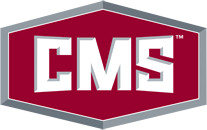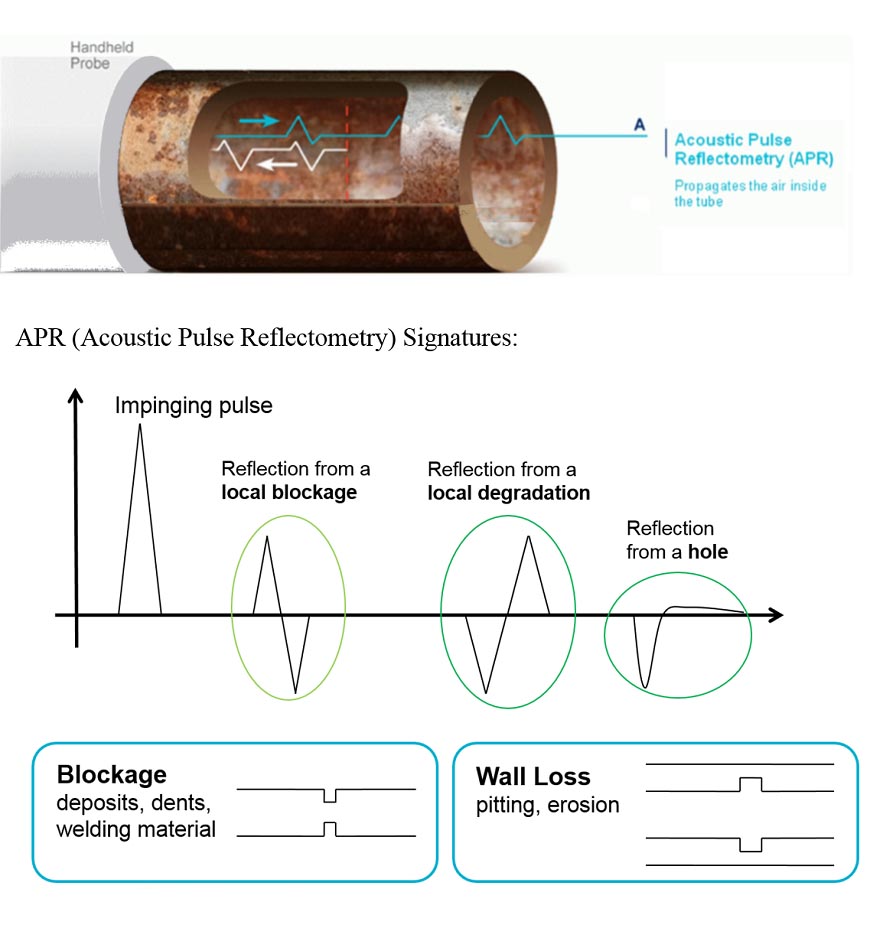Inspection Services
Is Your Operation Leaking Money?APRIS Inspections
Corrosion Monitoring Services innovative Acoustic Pulse Reflectometry Inspection System (APRIS) is designed specifically for detecting faults commonly found in industrial tube systems such as:
These could include leaks, increases in internal diameter caused by wall loss, full or partial blockages, as well as other issues that negatively impact your operations.
Using portable acoustic pulse reflectometry equipment, CMS inspectors direct one-dimensional acoustic waves at tubular systems to detect defects in along the contours of the tube inner diameter. If the pulse encounters a discontinuity in cross section, a reflection is created. The shape of the reflection enables inspectors to define the damage mechanism, which they then verify using a borescope. Through this process, CMS is able to quickly locate and isolate problem areas, such as holes in air preheater tubes and dust collector corrosion.
After identifying any holes, blockages, or other issues in your air preheater or other equipment, CMS can provide options to repair those systems and improve your operating efficiency. Those repair options vary from the short term fixes, such as sleeves that encapsulate cold end corrosion damage located near the tube ends and plugs to remove damaged tubes from service to major equipment repairs and replacements.
CMS APRIS inspections are able to accurately identify the exact location, type, and size of tube defects, without impacting outage schedules. Our APRIS inspection reports are translated into a tubesheet map that indicates the pattern of damage detected. In addition to the tubesheet map, sample plots from the APRIS are provided to illustrate the information used. The combination of this information enables the customer to plan tube repairs and replacements for improved operational efficiency and cost savings. For more information on Acoustic Pulse Reflectometry technology, you can visit the Talcyon APRIS website.
Pressure Testing
Pressure testing is an effective and inexpensive tool that can be used to identify air heater tube failures and determine the overall health of the unit. During this procedure, a CMS inspector pressurizes each tube and records the change in pressure to determine tubular air preheater leakage rates as they occur in damaged tubes.
During this test, a CMS inspector pressurizes each tube and records any drop in tube pressure and the associated time. The speed of the pressure change is an indication of severity of the air leakage. If a leak is detected, it may be possible to pinpoint the location by using the more advanced APRIS technique. Knowing the location of the leak may provide a clue in determination of the failure mechanism and provide guidance in the repair technique selection.
Repair Ready
Where failed tubes are identified within 12 inches of the tubesheet, CMS inspectors can install airtight sleeves to capture the failure behind the sleeve and keep the tube in service. In other cases, the tube can be removed from service by installing a mechanical plug at each end of the tube. Both methods are a quick way to improve boiler efficiency, recover airflow to the boiler and reduce fan power. These procedures can add up to measurable energy cost savings. CMS sometimes utilizes these temporary repairs to improve boiler efficiency, while allowing time to plan for a more permanent solution.
As with all CMS inspections, a detailed report is provided that includes a tubesheet map, documenting damaged tubes as well as any necessary repairs. CMS strives to not only provide a status report, but to help immediately improve your air heater performance and develop a long-term maintenance and corrosion prevention strategy.
Contact Corrosion Monitoring Services (CMS) at (800) 637-6592 and schedule an inspection that identifies any issues and enables you to conduct repairs before they grow into major problems or equipment failures.

